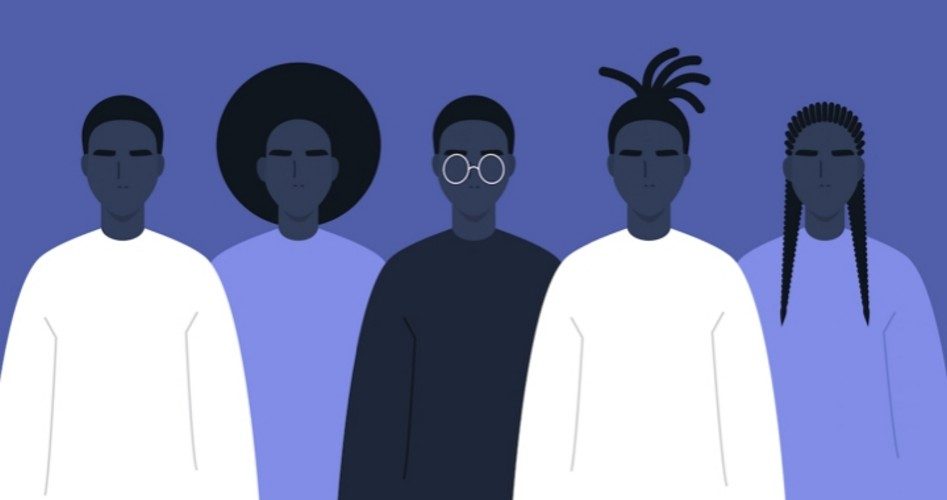
In another salvo in the cultural revolution, the mainstream media has now decreed that “black” when referring to Americans of black African ancestry should be capitalized — but not Americans of white European ancestry.
While this would seem to be an attempt to elevate one segment of Americans over another, Columbia Journalism Review (CJR) offered an explanation: “We capitalize Black, and not white, when referring to groups in racial, ethnic, or cultural terms. For many people, Black reflects a shared sense of identity and community. White carries a different set of meanings; capitalizing the word in this context risks following the lead of white supremacists.”
CJR cautioned against turning to “the largely lilywhite mainstream press, but to writers of color and to alternative stylebooks.” According to CJR, Sarah Glover, a past president of the National Association of Black Journalists, wrote in a recent piece that the ‘B’ in Black should become standard when describing people, noting, “We already capitalize Asian, Hispanic, African American and Native American.”
Alexandria Neason of CJR said that slavery had “deliberately stripped” people “of all other ethnic/national ties.”
The Associated Press and USA Today quickly followed suit, along with many local newspapers across the country.
As in all grammar questions, consistency is usually the determining factor, but not in this case. White, at least for now, will not be capitalized. CJR’s Mike Lewis argued for the discriminatory standard: “Black is an ethnic designation; white merely describes the skin color of people who can, usually without much difficulty, trace their ethnic origins back to a handful of European countries.”
One apparent hold-out in the establishment media is Kwame Anthony Appiah in The Atlantic. Appiah concurs that “there’s plainly a rationale for capitalizing black in order to head off ambiguity,” but added, “in English, the long-standing convention is to capitalize proper nouns or proper names, which are terms that refer to what philosophers call ‘particulars’ or ‘individuals’ — a specific person, place, or thing.” (This is why it has always perplexed me why Heaven and Hell are routinely not capitalized, but purely mythical places, such as Asgard or Gotham City are).
But Appiah, a professor of philosophy at New York University and the author of The Lies That Bind: Rethinking Identity, noted that the American Psychological Association has long insisted on capitalizing both ‘Black’ and ‘White’ instead of ‘black’ and ‘white.’ “But for some people, White is the sticking point.” Appiah notes that some have argued that the capital letter is a “benefit that white people should be awarded only after white supremacy has been rolled back.”
Appiah addresses the view of the Seattle Times, whose management decided, after receiving ‘counseling’ from a “diversity and inclusion task force,” that Blacks are those of the “African diaspora,” and capitalizing “Black” is proper because “it is a reflection of shared cultures and experiences,” such as foods, languages, music, and religious traditions. But “white,” which the Seattle Times said should be lowercase, refers instead to “people with light-colored skin, especially those of European descent. Unlike Black, it is lowercase, as its use is a physical description of people whose backgrounds may spring from many different cultures.”
“Here, I fear, we start to run into trouble,” Appiah wrote. “Does the Seattle Times imagine that Africa is less culturally varied than Europe? To what extent is blackness, as a social identity, really contoured by culture?” Appiah argued that “Barack Obama may, culturally speaking, have far more in common with his white Harvard Law School classmates than with someone from the Gullah community of the Georgia Low Country.”
“Without the theory and practice of racism, there are neither blacks nor whites,” Appiah argued.
On the contrary, Appiah wrote, “To not name ‘White’ as a race is, in fact, an anti-Black act which frames Whiteness as both neutral and the standard.”
In the end, it seems that certain cultural elites, take it upon themselves to determine such things. “In this country, the process of language reform is complicated,” Appiah said, noting that “some voices count more than others.” He offers as the example of the term African-American. Jesse Jackson and some other self-appointed leaders of the black community just decided that the term African-American should replace black. “At the time,” Appiah recalled, “the term didn’t necessarily sit well with many black Americans, especially older ones, used to insisting correctly that they did not personally come from Africa; but the mainstream media came aboard and, before long, it gained wide acceptance.” (Emphasis added.)
In other words, it was not a grass-roots movement, but was rather imposed from the top — to the point that many consider it almost bigoted not to use the term African-American instead of black, capitalized or lowercase. We see “Native American” being pushed to replace the term “American Indian,” although in Oklahoma, with its large population of American Indian tribes, American Indian is still widely used by tribal peoples themselves. While it’s true that, before the European discovery, indigenous peoples in the western hemisphere did not refer to themselves as “Indian,” it is just as true that they did not use the term “Native American.” Instead, they referred to themselves by their tribal name, just as peoples in Europe, Africa, and Asia did.
Those in the generation of the Founding Fathers tended to over-capitalize, while I would argue that there is a tendency today to under-capitalize. For example, why should the second word in a proper name not be capitalized, as Republican party? After all, the word party is as much a part of its name as Republican.
Another example of how the mainstream media simply dictates language changes is the word busing. Normal grammatical rules would provide that it should be spelled bussing, but word-counters at magazines such as Time just decided that they needed to change it. Today, if someone tries to spell it the old way, that person is considered uneducated.
Words are important. As George Orwell had a character in his class dystopian novel say, the destruction of certain words “narrow the range of thought” to the point that individuals in society are not as capable of a broader range of thought. Words can be weapons, and different individuals ascribe differing meanings to words, largely due to their own personal experiences.
At the end of the day, terms such as black and white, when referring to human beings, should be either both capitalized, or both lowercase. Capitalizing one, and not the other, is not grammar. It is a political statement, complete with a political agenda.
Image: nadia_bormotova / iStock / Getty Images Plus
Steve Byas is a university instructor in history and government, and the author of History’s Greatest Libels. He may be contacted at [email protected].


